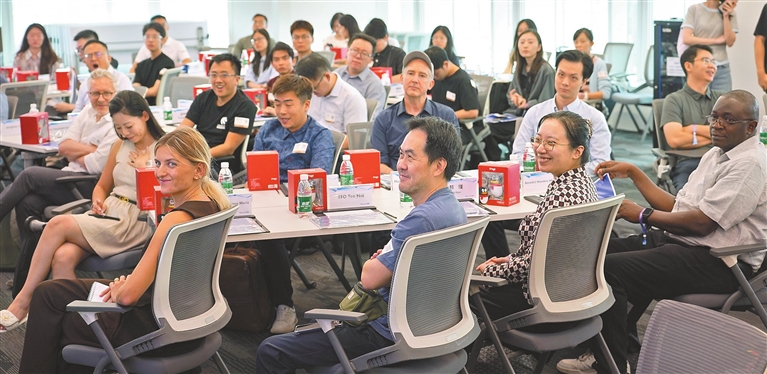
Wang Jingli wangjingli0715@163.com OVER 60 scholars and researchers from universities and research institutions at home and abroad — including the Stanford Institute for Human-centered Artificial Intelligence, The University of Manchester’s Global Development Institute, and Tsinghua University — visited Tencent for the “Technology for Good: Driving Social Impact” open research program yesterday morning. At Tencent’s Binhai headquarters in Nanshan District, the delegation visited an exhibition hall to learn about Yuanbao, the company’s large language model (LLM) AI assistant. They were also briefed on China’s Internet development history — from QQ and WeChat to live-streaming — and the Digital Dunhuang project. They also attended a lecture on AI industry trends and Tencent’s AI technology, which was delivered by Yuan Xiaohui, director of the Innovation Research Center at the Tencent Research Institute. Hugh Michael Davies, a scholar at the Royal Melbourne Institute of Technology who specializes in digital games, said he was most impressed with Tencent’s video conferencing and sound reduction technology after visiting the company’s exhibition hall. “I can see Tencent’s technology is available for everybody and useful for people’s daily lives. I can see how it would apply in all of our lives, saving hundreds of hours,” said Davies. Benedict Wandera Mkalama, a lecturer at the University of Nairobi, was also impressed by Tencent’s technology and innovations. Speaking of Tencent’s vision and mission — “Value for Users, Tech for Good” — Mkalama believes that it can enable development. “We are grappling with economic empowerment problems in Africa and Kenya. So how do we apply technologies for meaningful development? This is what I want to find from today’s event,” said Mkalama. The “Technology for Good: Driving Social Impact” open research program was jointly launched in April by the Center for Governance and Sustainability at the National University of Singapore Business School and Tencent. Focusing on topics related to digital technology and AI development, the program is recruiting global research fellows with influence in their respective fields. Selected fellows will regularly visit leading Chinese tech companies like Tencent for exchanges and field research, ultimately producing research findings. Since its launch, the program has received applications from 134 research fellows worldwide. | 
